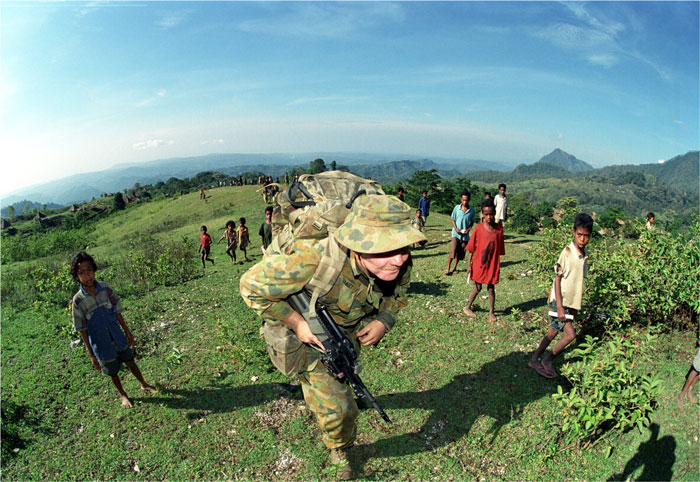Salvatore (Sam) Andaloro

Green, A. (1999). Troops talking to locals. Op Annondale was a patrol tin the mountains near Sua. Defence Imagery
Salvatore (Sam) Andaloro’s story begins about a week after the first Australian forces had arrived on the island of Timor-Leste. He was deployed as part of the International Force East Timor (INTERFET). To this day, Sam still remembers the sights and smells of the conflict that greeted him.
“Buildings had been trashed, and everyone had a look of damage and fear on their face.”
Sam’s role was to interrogate suspected militia members who had been picked up by INTERFET patrols. They initially set up their offices in the Comoro Airport.
“When we first got there it was like chaos: the walls were covered in faeces. The airport had been packed with thousands of people trying to get out because the militia were hacking and slicing people to death. So, we got there just as those people had been moved out, literally within hours of them moving out. And we came into the airport and it was horrific. The papers, the crap on the wall, blood, bloody bandages. Our first job was to clean that up.”
One of the biggest eye-openers for Sam was the extremes that people could be pushed to when placed in a horrific situation.
“I had gone over there with very black and white views on militia, and my views were if you are militia you are bad, evil and you have been involved in all of these things against the East Timorese and we are going to deal with you.”
But Sam was not prepared for the fact that so many of the East Timorese had joined the pro-Indonesian militias only under duress.
“After interviewing so many of them, I started to hear the same story over and over again, ‘I had to do it because they had a gun to my head’, or ‘They had a machete to my wife’, or ‘They were going to rape my daughter.’”
At first, Sam dismissed those statements as excuses. He didn’t believe that it was possible for someone to stab or shoot a person if they didn’t want to. But gradually, as he interviewed more people, he heard the same stories and received corroborating evidence, and his views started to shift.
“I thought, it is not up to me to judge somebody that has had their family threatened. And we know the militia would have followed through with their threats. They would have killed or raped their families, they did all those things, we saw evidence of it all over the country.”
Source: Voices of War, Hachette Australia, 2006.
